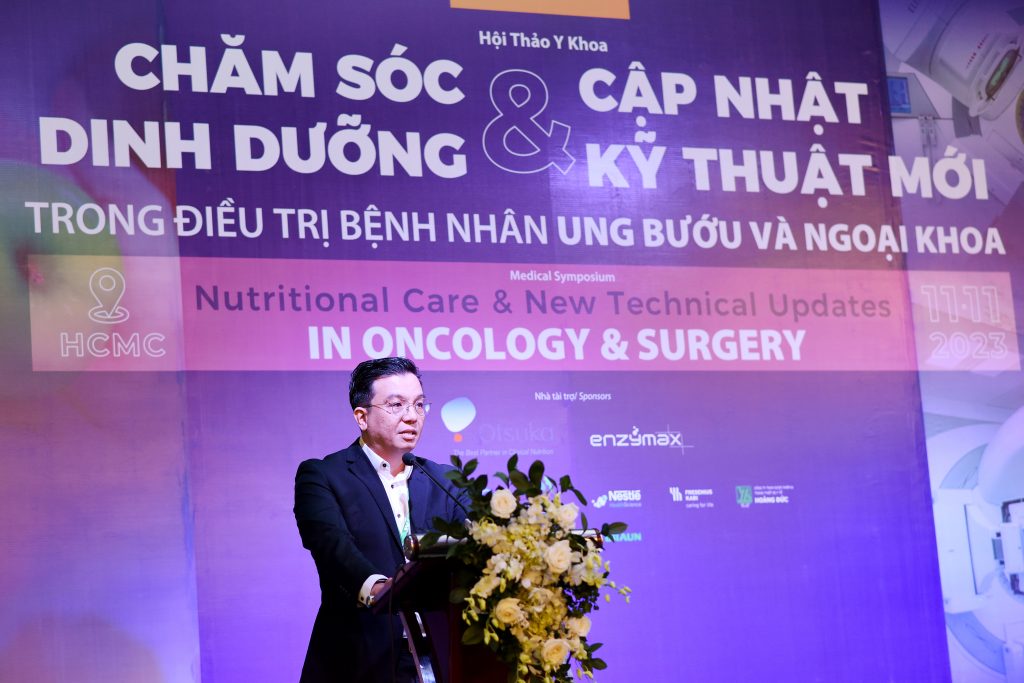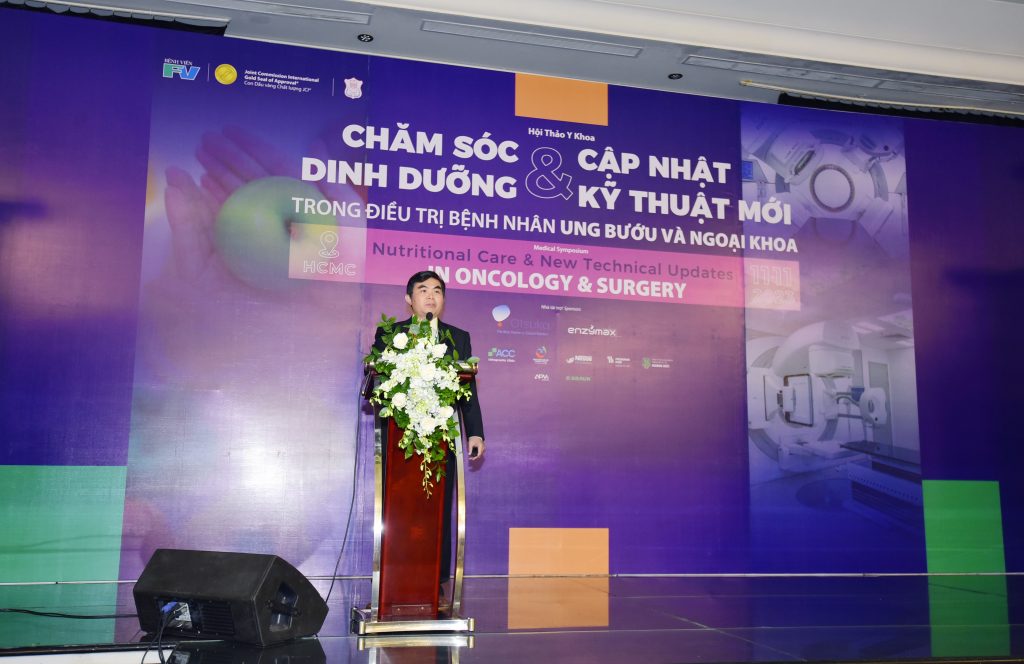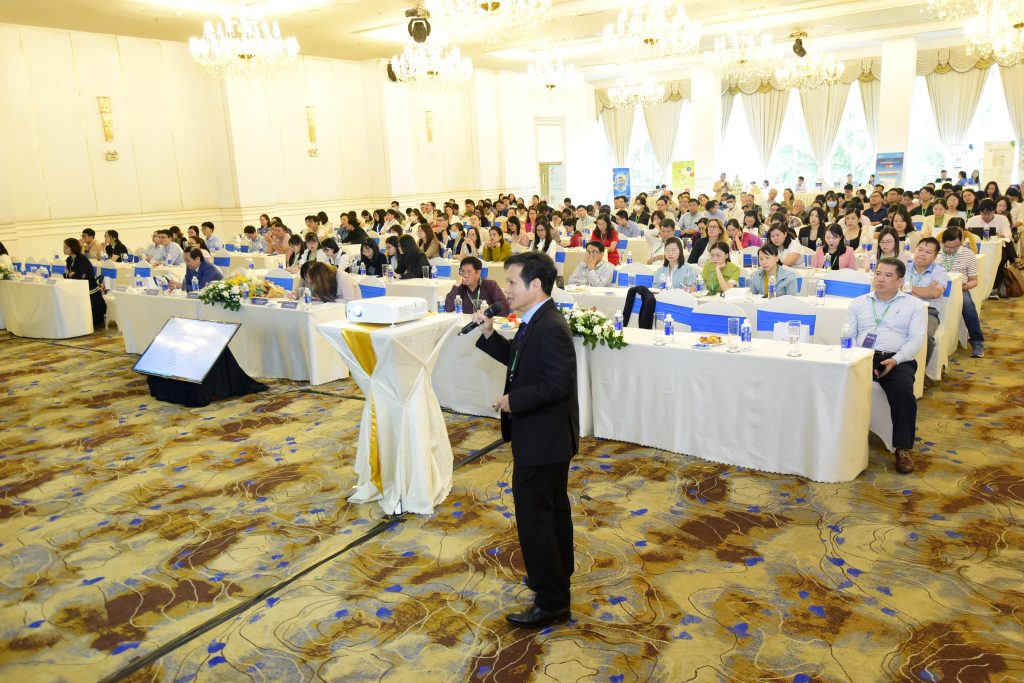FV Hospital, in collaboration with Hanoi Medical University, has successfully hosted the medical symposium “Nutritional Care & New Technical Updates in Oncology & Surgery.” The conference took place on the morning of November 11, 2023, in Ho Chi Minh City, and was attended by more than 230 doctors and experts in the fields of oncology, surgery, and nutrition.
Nutrition is an important factor for post-operative recovery.
Speaking on behalf of the organiser at the opening of the event, Medical Director of FV Hospital Do Trong Khanh, MD, PhD, expressed gratitude to the speakers, colleagues, and event sponsors. Dr Khanh stated, “FV has strived for many years to become a central hospital, helping to reduce pressure on first-level hospitals in Ho Chi Minh City. The symposium is a place for us to listen and share our experience in developing modern treatment strategies.”
Dr Khanh noted that FV’s patient-centric model, investment in science and technology, and multi-specialty coordination in treatment, continues to offer patients a more comprehensive treatment experience.

To open the symposium, Head of Gastroenterology and Hepatology Tran Phung Dung Tien, MD, PhD, presented a series of clinical cases in his report “Nutrition after Colorectal Anastomosis Surgery due to cancer.” Dr Tien’s presentation focused on sharing useful experience that his unit has gathered through practice. He shared some early postoperative recovery programmes, nutritional recommendations, nutritional regimens and adjustments after colorectal surgery. “Early nutrition brings great benefits in post-operative recovery; however, it is necessary to accurately assess the patient’s general health, combined with the flexibility of the doctor’s experience,” Dr Tien concluded.

Continuing the topic, FV’s Head of General Surgery Dr Phan Van Thai, Specialist Level II, presented the topic “Nutrition after Total Pancreatectomy Due to IPMN/Pancreatic Cancer.” Dr Thai said, “Although total pancreatectomy does not incur many difficulties in terms of surgical technique, the problem lies in post-operative nutritional treatment.” Pancreatectomy affects endocrine and exocrine insufficiency in the body.
Pancreatectomy reduces the production of insulin analogues, leading to the patient becoming diabetic. Dr Thai said that he treats patients similarly to those that have type-1 diabetes, monitoring the patient’s blood sugar, endocrine, and digestive systems regularly, working closely with doctors in endocrinology and nutrition.

After total pancreatectomy, the rate of exocrine pancreatic insufficiency is almost absolute. Besides, patients may also suffer from other diseases of the pancreas, fat and protein metabolism disorders, or malnutrition. Dr Thai said that treatment with drugs providing new-generation pancreatic enzymes, combined with nutrition strategies before, during, and after surgery, has achieved positive results, not only for patients undergoing pancreatectomy but also for people with pancreatic insufficiency.
Le Quan Anh Tuan, MD, PhD, Head of Liver, Gallbladder and Pancreatic Surgery, Ho Chi Minh City University of Medicine Hospital, emphasised the role of nutrition in surgical treatment. The report “Nutrition for Surgical Patients under the ERAS Programme” also points out difficulties in implementing ERAS (Enhanced Recovery After Surgery) in clinical practice, especially coordination problems between many different specialties and units.

In addition, Dr Tuan also mentioned factors that cause incorrect assessment of patient nutrition, as well as nutritional intervention options according to ERAS. “Implementing ERAS is a long commitment and there are still many barriers in terms of human resources. However, the benefits for patients are very positive,” said Dr Tuan.
The reporters in the field of surgery also emphasised the implementation of ERAS in practice to bring greater benefits to patients. This is a comprehensive care strategy combining multi-specialties to optimise the care and treatment process before, during, and after surgery, shorten hospital stay, reduce complications, and reduce costs, while increasing patient satisfaction.
Nutrition is considered a main component of the ERAS programme. Nutritional support provides a more optimal regimen for cancer patients.
Regarding the topic of radiation in cancer Head of Hy Vong Cancer Care Centre Dr Basma M’Barek gave a presentation on advanced radiotherapy techniques.
Dr Basma explained that 60 per cent of cancer patients need radiation therapy. Up to 80 per cent of patients have acute side effects when participating in radiotherapy and around 50 per cent experience side effects later, greatly affecting these patients’ quality of life.

Currently, many modern radiotherapy methods have been developed, such as IMRT, VMAT, and SBRT, all of which offer high treatment efficiency, reduce side effects, limit effects on surrounding healthy organs, and can support a nutrition plan as they are less likely to cause difficulty swallowing or digestive diseases than preceding treatment protocols. Through typical cases, Dr Basma shows that applying advanced radiotherapy at the right time and dosage will help the patient’s condition become more stable, thereby leading to favourable conditions in providing solutions. Early nutrition for patients, as part of an accurate treatment plan, helps reduce the possibility of treatment interruptions, reduce acute side effects, and reduce treatment costs.
Focusing on nutrition for cancer patients, Dr Tran Thi Anh Tuong, Specialist Level II, Head of Nutrition & Dietetics Department, Ho Chi Minh City Oncology Hospital, pointed out clear effects in clinical practice. Dr Tuong’s presentation “Optimal Nutritional Intervention for Cancer Patients During Hospital Stay and After Discharge” revealed that up to 80.4 per cent of cancer patients suffer from malnutrition, and 30 per cent of chemotherapy is not possible because their physical condition does not improve, with about 42.5 per cent of malnutrition being irreversible. In addition, only about 24.2 per cent of oncology patients received nutritional treatment (study on 1373 samples).

Dr Tuong shared, “Nutrition counselling is a decisive factor in the cancer treatment process, and close coordination between specialties is also crucial to achieving greater effectiveness.” Through an engaging presentation, Dr Tuong proposed the 3T nutritional feeding strategy (Targeting, Titrating, Timing), early consideration of feeding via a percutaneous gastrostomy with a PEG tube for patients with head and neck cancer, cancer cachexia intervention, and diet planning options. This provides a more consistent perspective in nutritional support for patients during cancer treatment.
Continuing the topic of nutrition, the presentation of FV’s Head of Nutrition & Dietetics Dr Nguyen Viet Quynh Thu, Specialist Level II, focused on “The Role of Immune-support Nutrients in Cancer Patients Undergoing Surgery, Chemotherapy, and Radiotherapy.” During the process of cancer treatment, many patients encounter nutritional and brain disorders leading to anorexia and changes in taste. Inadequate nutritional support also increases treatment time, costs, complications, and is the cause of death in 20 per cent of cancer patients.

Dr Thu said, “Using immune boosters helps improve nutrition and mental health for cancer patients. This method is also safe and helps reduce many complications for patients.” Dr Thu shared that FV measures micronutrients, understands the general health of cancer patients, and has established a Nutritional Support Team.
In the final part of the conference, Nguyen Thuy Linh, MD, PhD, Deputy Head of Nutrition Department, Hanoi Medical University Hospital, presented typical clinical cases of nutritional intervention in cancer treatment. Those patients that experience swallowing disorders, mainly due to head and neck cancer treatment, often have problems with severe malnutrition and anaemia.
Dr Linh shared a plan to help feed this group, ensuring nutrition and limiting risks when feeding, even in situations where caregivers must be instructed. “Depending on the conditions of each medical facility, we will use medical staff or family members. However, it is necessary to guide the method and control the process to ensure optimal outcomes for the patient,” Dr Linh concluded.

The medical symposium “Nutritional Care & New Technical Updates in Oncology & Surgery” introduced many treatment updates to attendees, especially with regards to clinical nutrition issues. Ultimately, this development of new insights will support the development of more effective treatment plans for oncological and surgical diseases, ensuring a better quality of life for patients.

 Vi
Vi 












